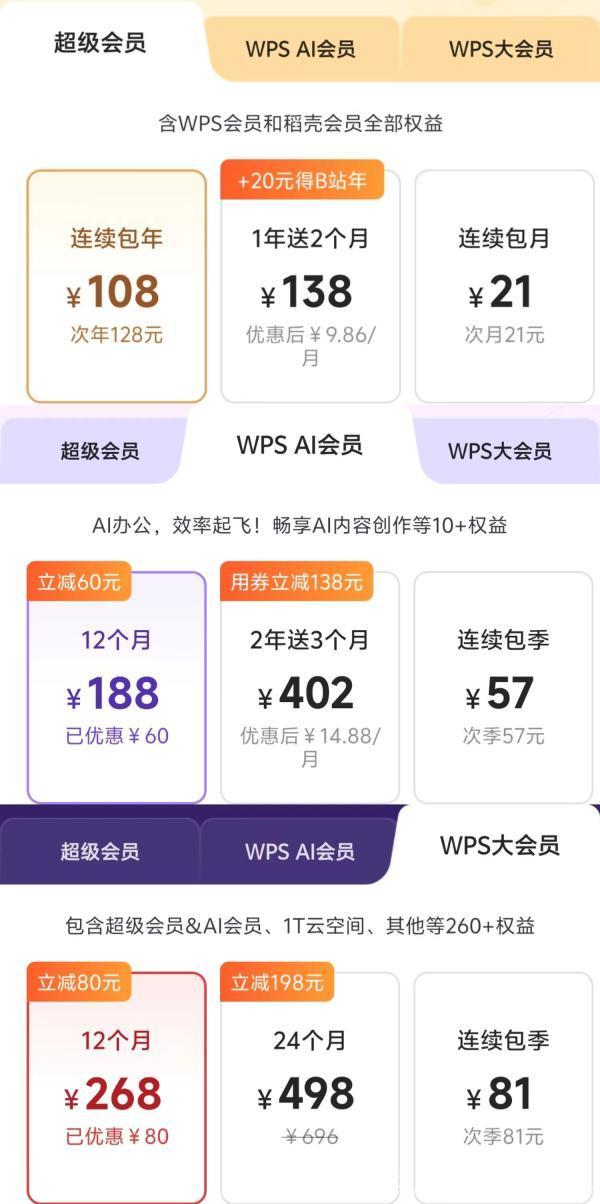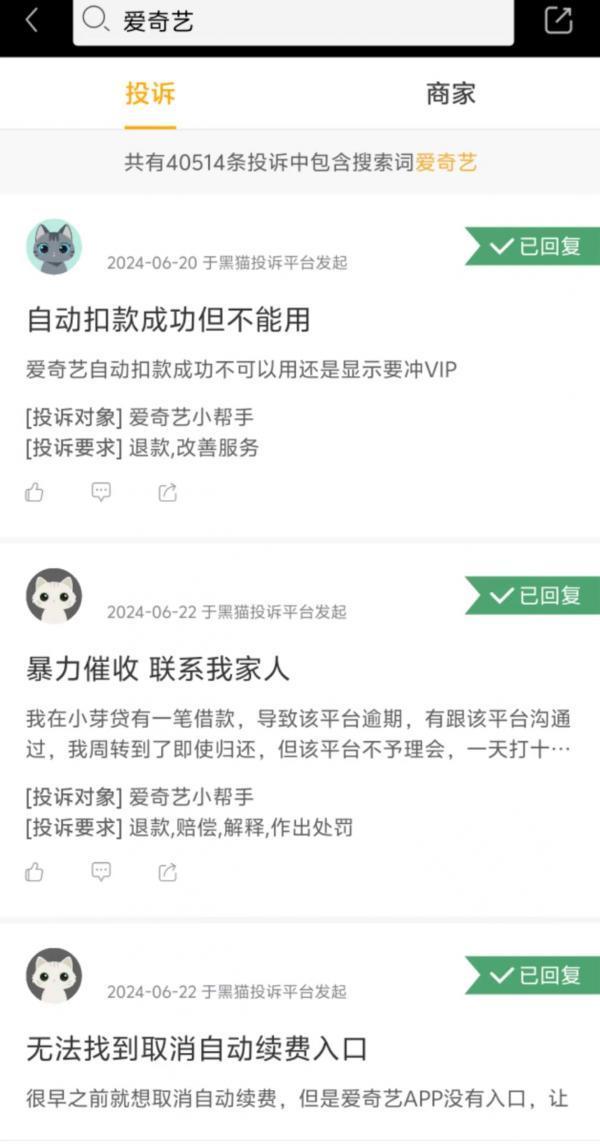VIP not enough? there's SVIP: how deep do membership "stacking" schemes go?
![]() 07/17 2024
07/17 2024
![]() 466
466

You ask me how deep the "tricks" of internet memberships run? Just look at iQIYI.
On July 3rd, "iQIYI ordered to compensate 41 days of Gold VIP membership" hit the trending topics, dominating the charts for 8 hours...

Weibo screenshot
The incident began in early 2023 when Zhu Yuan, a seven-year "old fan" of iQIYI, discovered that iQIYI had limited the projection clarity of Gold VIP members to 480P. Higher clarity required upgrading to a higher-level membership. Zhu Yuan had continuously recharged to become a Gold VIP member on the iQIYI platform for over five years, during which time any clarity projection was available.

Comparison of iQIYI membership prices and benefits screenshot
Zhu Yuan believed, "iQIYI's unilateral forced 'harvesting' behavior is a bit ugly." Due to the projection restriction, Zhu Yuan decided to sue iQIYI, and after more than a year of trial, the first instance verdict was finally handed down. The court ruled: iQIYI should compensate the plaintiff with 41 days of Gold VIP membership.
The matter was not over yet. On July 13th, the plaintiff Zhu Yuan decided to appeal. Zhu Yuan stated, "Since the first instance judgment gave me 41 days of membership compensation, I kindly request that iQIYI also provide the same duration to Gold VIP users from January 11, 2023, to February 20, 2023." Zhu Yuan appealed, "Right now, it's just me who won the lawsuit. The current mechanism doesn't allow iQIYI to treat damaged members equally, and I personally believe that such a mechanism should be established as soon as possible."

Zhu Yuan's lawyer's Weibo
In recent years, "Russian doll-style" membership fees have emerged continuously on the internet. Rising membership fees, restrictions on device projection, limits on the number and method of device logins, and increasing member advertisements have caused numerous user complaints. Zhu Yuan's continued appeal has also earned cheers from affected netizens.
01 The giants who rely on memberships to "survive"
Once upon a time, making money from users while giving away services was a proud existence in internet business models. Charging merchants and advertisers instead of users made the internet seem like a beacon of hope.
Today, that beacon has turned into a "green tea bitch," not only charging users but also finding ways to charge more.
Counting the memberships of various platforms, there are Meituan members and Ele.me members for food delivery; for online shopping, there's Taobao 88VIP and Pinduoduo monthly cards; for pursuing dramas and listening to music, iQIYI, Youku, Mango TV, Tencent Video, NetEase Cloud Music, and QQ Music all require memberships; even reading novels on Zhihu and using CapCut templates have become paid services...

Screenshots of various platforms
Just as users lament that "everything requires a membership," membership income has quietly become the second-largest source of income for various platforms. For long-video platforms, it has even grown to be the primary source of income.
Taking iQIYI as an example, its revenue mainly comes from four parts: membership income, online advertising, content distribution, and other income. Among them, membership income and advertising income are the two core components.
Before 2019, advertising was iQIYI's most important source of income, followed by membership income. Since then, the company's business structure has undergone significant changes, with membership income growing rapidly while advertising income has declined. Today, their positions have completely swapped. In 2023, iQIYI's advertising income dropped to 6.22 billion, accounting for only 19.5% of revenue, while membership service income reached 20.34 billion, accounting for 63.7% of revenue, almost triple that of advertising.
Next is Mango Media. According to its 2023 annual report, in terms of membership scale, the effective membership of Mango TV reached 66.53 million at the end of 2023, with annual membership income reaching 4.315 billion yuan, an increase of 10.23% year-on-year. In contrast, advertising revenue decreased by 11.57% to 3.532 billion yuan.
Looking at Tencent, although it does not separately show this in its financial reports, the number of paid members on Tencent Video reached 117 million, and the number of paid members on Tencent Music also reached 107 million, both leading the industry, with income that cannot be underestimated.
Apart from long-video platforms, financial reports show that Zhihu's revenue in 2023 was 4.198 billion yuan, an increase of 16.5% year-on-year. Among them, paid membership income reached 1.826 billion yuan, an increase of 48.4% year-on-year, surpassing advertising and becoming Zhihu's largest source of income.
Overall, membership income has become an important source of income for various platforms, with the wool once again coming from the sheep.
02 Rising tricks, declining value
Of course, platforms can rely on memberships to "survive," but that doesn't mean users will accept endless tricks from membership platforms. Many users believe that paying is fine, but not paying again after paying.
"Even after buying a membership, there are still ads," "After paying for a membership, I can't project and need to pay again," "Watching movies or advanced screenings requires additional spending." There are various VIPs, SVIPs, super members; yellow diamonds, luxury yellow diamonds; ordinary members, gold members, diamond members, plus restrictions on playback...

Data source Weibo, compiled by Yidu Pro
More and more users are starting to resent this "Russian doll" behavior of memberships. "I feel like I'm being harvested, wave after wave," said Qiaoqiao, who loves editing and posting short videos on her platform, "I've been using CapCut for years, and suddenly it started charging. Even if I pay for a membership, it's not completely free, and some templates still need to be purchased separately. It's just insatiable."

Xiaohongshu screenshot
Xiaowen, who shops on Taobao daily, has a different perspective: "I think bundled sales of memberships are also disgusting. To make their memberships seem worth the price, they bundle various unwanted APP memberships. I'll sell the other memberships on Xianyu to recoup some money."
With policies above and countermeasures below, users are finding cracked versions to deal with countless memberships. Opening Xianyu, you can even see discounted memberships for sale. The core reason behind users' initial acceptance of membership systems and subsequent complaints or even lawsuits is that the same price no longer buys the same service.

Xianyu screenshot
"Take the iQIYI lawsuit, for example. I'm also one of the victims. I've been subscribing to iQIYI's membership, but my projection was restricted, so it feels great to see Lawyer Zhu Yuan continue to appeal and help us demand compensation," said Xiaoxiao, who loves dramas and variety shows and moves between various platforms.
"Actually, long-video platforms all have this problem. A while ago, when I was watching 'Mo Yu Yun Jian' and getting close to the finale, suddenly I needed to pay separately. It's really disgusting how they charge for advanced screenings." More and more users like Xiaoxiao feel that their interests are being harmed.
03 Russian doll memberships hurt member sentiment
Why are users increasingly resentful, yet this hasn't stopped membership tricks from getting deeper?
Not long ago, WPS was accused of suspected arbitrary changes to membership levels and "Russian doll-style" charging issues. Some users reported that WPS's membership structure was complex, with at least six membership levels appearing successively. Some membership levels also had several "independent packages" with separate charges. This "big doll containing small dolls" membership system can easily confuse members due to information asymmetry.

WPS pricing screenshot
The reason WPS risks being criticized and complained about by users while still implementing "Russian doll-style" charging likely stems from its revenue anxiety. In December last year, WPS announced that it would permanently shut down its advertising services. In WPS's 2024 Q1 financial report revenue composition, advertising income is no longer visible.
The same anxiety is even more apparent among long-video platforms, where membership fees have surpassed advertising revenue to become the primary source of income. Platforms can no longer do without membership income. Therefore, most apps with "Russian doll-style" charging are long-video software. To retain users and earn profits, all platforms must focus more on memberships.

Image source: Screenshots of some apps, compiled by Yidu Pro
Apart from platforms that rely on membership income, some, like e-commerce platforms, use membership benefits to guide consumer spending, manipulating user psychology. For example, Pinduoduo's money-saving monthly card and 1688's full-discount coupons. Xiaowen said, "I originally signed up for membership to save money, but ended up buying some useless things to avoid wasting coupons, spending even more in the end."
Whether it's for revenue or to retain users, various giants are launching various "Russian doll-style" memberships, leading to severe user complaints and deepening conflicts with users. For example, according to data from the Hei Mao Complaint Platform, there are over 40,000 complaints related to iQIYI, most of which are about membership fees and forced deductions.

Hei Mao Complaint Platform screenshot
Russian doll memberships have become the primary culprit in hurting the relationship between members and platforms.
However, there is also a glimmer of hope for this harm to user sentiment. In February of this year, the State Administration of Radio and Television, together with relevant departments and units, held a meeting to summarize and deploy the work of governing "Russian doll" fees and complex operations in television. The meeting reported on the progress and results of the first phase of governing "Russian doll" fees and complex operations in television—China has achieved the complete elimination of boot-up advertisements on cable TV and IPTV.
Conclusion
In the opinion of Zhu Wei, Deputy Director of the Communication Law Research Center at China University of Political Science and Law, "membership tricks" have complex market and economic factors behind them: "The rise of the 'free + value-added service' internet economic model has brought the internet to a stage of free openness to the general public, but value-added services require payment, manifested as memberships. The amount paid determines membership levels such as diamond, gold, and supreme, with different benefits enjoyed."
Zhu Wei believes that users choose to register for memberships because they pursue better services. This requires enterprises to return to the essence of competition and provide better, safer, and more efficient services so that both ordinary users and true members are willing to stay.
In this regard, mature foreign membership systems like Netflix do a great job. Users continue to receive high-quality content resources after paying, and they are willing to pay. Objectively speaking, Netflix is now profitable, relying almost entirely on membership fees for its profit model.
For this reason, domestic platforms should jump out of the "muddy pond" of Russian doll memberships and retain users with content and services, making users feel that their membership fees are worth it. This is the right way to go.
(Note: Qiaoqiao, Xiaowen, and Xiaoxiao are pseudonyms in this article.)
Images are sourced from Shutterstock's official website and will be removed upon infringement.








